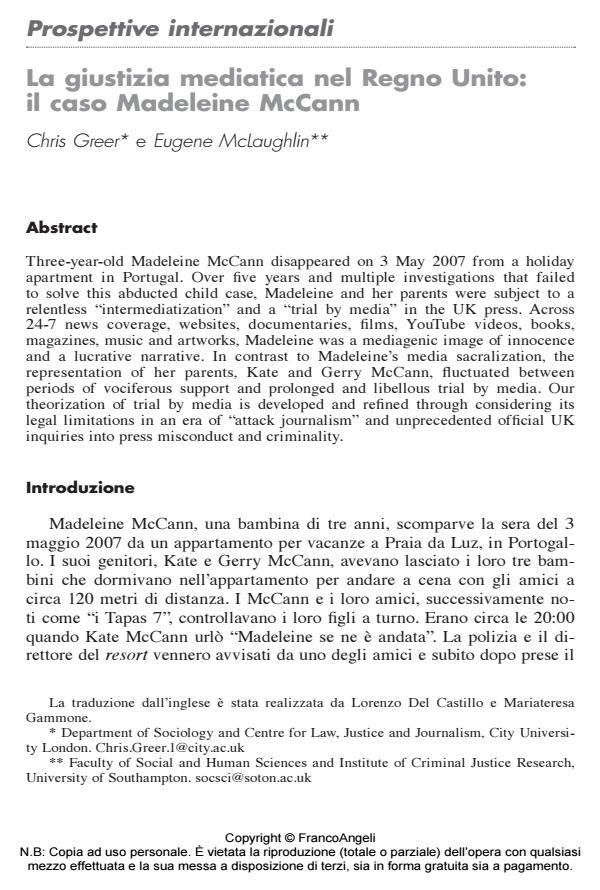La giustizia mediatica nel Regno Unito: il caso Madeleine McCann
Titolo Rivista SICUREZZA E SCIENZE SOCIALI
Autori/Curatori Chris Greer, Eugene McLaughlin
Anno di pubblicazione 2013 Fascicolo 2013/2
Lingua Italiano Numero pagine 14 P. 151-164 Dimensione file 239 KB
DOI 10.3280/SISS2013-002012
Il DOI è il codice a barre della proprietà intellettuale: per saperne di più
clicca qui
Qui sotto puoi vedere in anteprima la prima pagina di questo articolo.
Se questo articolo ti interessa, lo puoi acquistare (e scaricare in formato pdf) seguendo le facili indicazioni per acquistare il download credit. Acquista Download Credits per scaricare questo Articolo in formato PDF

FrancoAngeli è membro della Publishers International Linking Association, Inc (PILA), associazione indipendente e non profit per facilitare (attraverso i servizi tecnologici implementati da CrossRef.org) l’accesso degli studiosi ai contenuti digitali nelle pubblicazioni professionali e scientifiche.
Three-year-old Madeleine McCann disappeared on 3 May 2007 from a holiday apartment in Portugal. Over five years and multiple investigations that failed to solve this abducted child case, Madeleine and her parents were subject to a relentless "intermediatization" and a "trial by media" in the UK press. Across 24-7 news coverage, websites, documentaries, films, YouTube videos, books, magazines, music and artworks, Madeleine was a mediagenic image of innocence and a lucrative narrative. In contrast to Madeleine’s media sacralization, the representation of her parents, Kate and Gerry McCann, fluctuated between periods of vociferous support and prolonged and libellous trial by media. Our theorization of trial by media is developed and refined through considering its legal limitations in an era of "attack journalism" and unprecedented official UK inquiries into press misconduct and criminality.
- Crime Statistics in the News Jairo Lugo-Ocando, pp.103 (ISBN:978-1-137-39840-6)
Chris Greer, Eugene McLaughlin, La giustizia mediatica nel Regno Unito: il caso Madeleine McCann in "SICUREZZA E SCIENZE SOCIALI" 2/2013, pp 151-164, DOI: 10.3280/SISS2013-002012